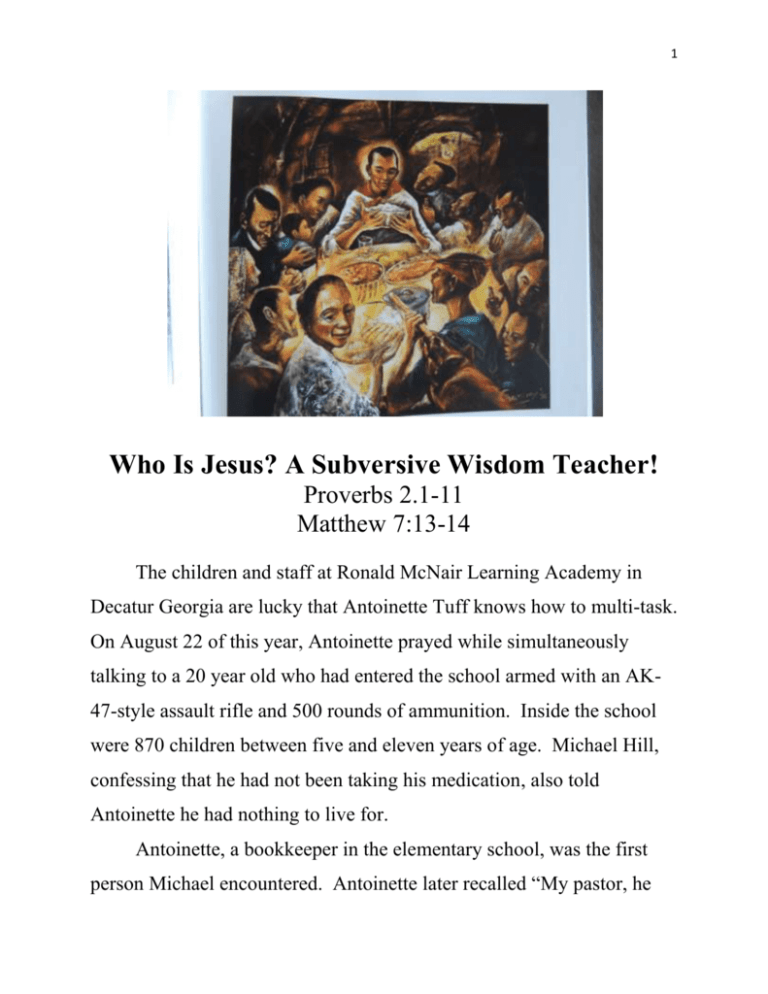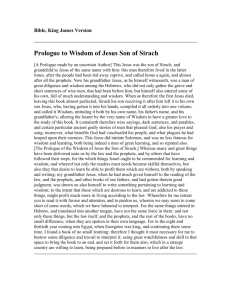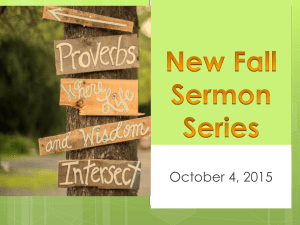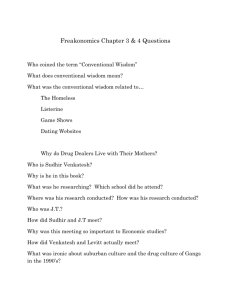26 Ordinary. Subversive Wisdom Teacher
advertisement

1 Who Is Jesus? A Subversive Wisdom Teacher! Proverbs 2.1-11 Matthew 7:13-14 The children and staff at Ronald McNair Learning Academy in Decatur Georgia are lucky that Antoinette Tuff knows how to multi-task. On August 22 of this year, Antoinette prayed while simultaneously talking to a 20 year old who had entered the school armed with an AK47-style assault rifle and 500 rounds of ammunition. Inside the school were 870 children between five and eleven years of age. Michael Hill, confessing that he had not been taking his medication, also told Antoinette he had nothing to live for. Antoinette, a bookkeeper in the elementary school, was the first person Michael encountered. Antoinette later recalled “My pastor, he 2 just started teaching on anchoring, and how you anchor yourself in the Lord…I just started praying.” But, Antoinette not only prayed, she also began talking to the young man with respect and compassion. Much of the conversation was recorded on cell phone as she spoke with Michael, talked to emergency dispatchers, negotiated with police and prayed. Antoinette said things like “We’re not going to hate you,” referring to him as sir and later as “sweetie” and “baby”. Antoinette went on to tell Michael about her own travails, her divorce and disabled son, all the while reassuring him. “I love you,” she said. “I’m proud of you. We all go through something in life.” If you are unfamiliar with the story of this strong African American woman who helped this broken young white man it is probably because it all turned out peacefully. No one was killed. No one was hurt. There was no repetition of Newtown, Connecticut with 20 children and six adults all killed in a very similar situation. Antoinette kept the police at a distance, persuaded Michael to give up his weapon, lie on the floor and give himself up. When I read the story posted in the Guardian by Gary Younge, I thought this is a sermon. I only need to read this story and Younge’s excellent reflections and sit down. But, we are in the midst of a continuing reflection on the question of Who Is Jesus?, and I believe this story of Antoinette and Michael offer us yet another way of bringing Jesus into focus. Our guide this morning is Matthew. Last week we viewed the picture Mark creates of 3 Jesus as a healer and liberator. This morning we draw upon the painting Matthew creates of Jesus as a “subversive wisdom teacher”. Matthew is particularly interested in helping us recognize in his image of Jesus the continuity between the wisdom we find in Jesus and the long wisdom tradition found in the Hebrew Scriptures. The image of Jesus as a subversive wisdom teacher is found in our passage this morning. ‘Enter through the narrow gate; for the gate is wide and the road is easy that leads to destruction, and there are many who take it. For the gate is narrow and the road is hard that leads to life, and there are few who find it. (Matthew 7:13-14) In his book “Meeting Jesus Again for the First Time”, Marcus Borg says, there are basically two types of wisdom. There is conventional wisdom, which is the dominant wisdom of a culture, that the majority of people knows and believes to be true. The second type, says Borg, is a subversive, alternative wisdom, which ultimately “undermines conventional wisdom and speaks of another way, another path.” The conventional way of wisdom is the wide gate, the wide road, that leads to destruction. Jesus says traveling that road is like being on the freeway during rush-hour, it is packed with travelers. The alternate road of wisdom is more like traveling a narrow side street with which few people bother. Following the mass shooting in Newtown Connecticut, Wayne LaPierre, head of the National Rifle Association offered these words of 4 wisdom, “the only thing that stops a bad guy with a gun is a good guy with a gun.” In his article about Antoinette and the elementary school in Decatur Georgia, author, Gary Younge notes what the wide way often looks like in our country, “Our politics,” says Younge, “particularly in an age of terror, austerity and growing inequality, is predicated on the basis that people are basically venal, selfish, dishonest and untrustworthy. The poor are assumed not to be looking for work, but cheating on welfare, foreigners are assumed to be taking something from a culture rather than contributing something to it; public sector workers, like Tuff, are assumed not to be devoted to public service but a drain on our taxes. The disabled are assumed to be well. When we look at others, the default position in much of western political culture is not to see ourselves in them but see a threat.” Younge goes on to add, “Tuffs courage stands as the most dramatic illustration of the degree to which we are, and can be, so much more impressive than our politics suggest.” Although Younge never uses the language, he is nonetheless describing two different types of wisdom. The dominant wisdom, the way of the world says, know your enemy, arm yourself with protection, assume the worst in people. The alternative wisdom of Jesus, the subversive wisdom of the narrow way, insists on treating everyone as loved by God. In his book “God Is Not A Christian”, Bishop Desmund Tutu reflects this narrow way of subversive wisdom when he says, “Every 5 human being is precious. We are all – all of us – part of God’s family. We all must be allowed to love each other with honor. Yet, all over the world, lesbian, gay, bisexual, and transgender people are persecuted. We treat them as pariahs and push them outside our communities. We make them doubt that they too are children of God. This must be nearly the ultimate blasphemy. We blame them for what they are…The Jesus I worship is not likely to collaborate with those who vilify and persecute an already oppressed minority…To discriminate against our sisters and brothers who are lesbian or gay on grounds of their sexual orientation for me is as totally unacceptable and unjust as apartheid ever was.” pg. 55. In her book “Practicing Peace” Buddhist nun Pema Chodrin writes about this alternative subversive wisdom when she says, “I was recently rereading the writings of Martin Luther King Jr. and I understood once again that the whole movement was based on love – love that doesn’t exclude anybody.” pg. 24 Marcus Borg points out the wisdom Jesus offers is not about the right information or even the right morals. The wisdom Jesus offers is about a way of seeing the world, a pathway to living that leads to life. Borg says, “conventional wisdom is intrinsically based upon the dynamic of rewards and punishments. You reap what you sow; follow this way and all will go well, you get what you deserve, the righteous will prosper,… work hard and you will succeed. And…if you don’t 6 succeed, or are not blessed, or do not prosper, it is because you have not followed the right path.” pg. 76. This is the wide gate, the wide road, the road of conventional wisdom. The narrow gate, the wisdom path Jesus invites us to walk is the path of Bishop Tutu, the path of Buddhist nun Pema Chodrin and the path of Antoinette Tuff, who anchoring herself in the wisdom of Jesus says to a troubled young man, with an assault rifle in his hands, “I love you. I am proud of you. We all go through something in life.” Antiracism is also an alternative wisdom. It goes against a dominant culture way of seeing and approaching the world. As a congregation we have entered a time of discussion and reflection about what it means for us as a congregation committed to antiracism to have a white stained glass Jesus. One of the questions we may wish to be asking is, does this image of Jesus pictured in our window reflect the subversive wisdom of Jesus or does this image reflect the dominant wisdom of our culture? Does the image invite us through the narrow gate about which Jesus speaks or does the image reinforce the wisdom of the super highway at rush hour? Walking the subversive wisdom path Jesus invites us to walk is the path that leads to life, but as Jesus also says “the road is hard”, it is no easy path. Gary Younge, writes that when Antoinette Tuff hung up on the dispatcher and the police took Hill, she uttered through her tears, “Woo, Jesus.” 7 Proverbs 2.1-11 The Hebrew people were convinced that when they sought to live in accordance with the love and justice of God they were also given wisdom that can be applied to daily life. Our passage from Proverbs is part of the wisdom tradition found in the Hebrew Scriptures, passed down from one generation to the next. 2My child, if you accept my words and treasure up my commandments within you, 2 making your ear attentive to wisdom and inclining your heart to understanding; 3 if you indeed cry out for insight, and raise your voice for understanding; 4 if you seek it like silver, and search for it as for hidden treasures— 5 then you will understand the fear of the LORD and find the knowledge of God. 6 For the LORD gives wisdom; from his mouth come knowledge and understanding; 7 he stores up sound wisdom for the upright; he is a shield to those who walk blamelessly, 8 guarding the paths of justice and preserving the way of his faithful ones. 9 Then you will understand righteousness and justice and equity, every good path; 10 for wisdom will come into your heart, and knowledge will be pleasant to your soul; 11 prudence will watch over you; and understanding will guard you. Matthew 7:13-14 As a wisdom teacher Jesus knew that wisdom was given to those who walked the path of wisdom, which is also the path of God’s love. ‘Enter through the narrow gate; for the gate is wide and the road is easy that leads to destruction, and there are many who take it. For the gate is narrow and the road is hard that leads to life, and there are few who find it.





